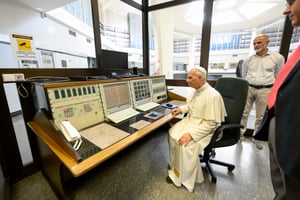Vatican Voices on AI: A Call for Ethical Considerations Amid Technological Advancements
At the recent Second Annual Rome Conference on Artificial Intelligence, Pope Leo XIV took center stage, urging attendees to contemplate the ethical challenges that accompany rapid advancements in AI. The gathering attracted a diverse crowd, including Vatican officials, U.S. academics, and high-profile executives from tech giants like Google, OpenAI, and Meta.
The Ethical Dimension of AI
Pope Leo emphasized the need for serious reflection on AI’s moral implications, pairing its “extraordinary potential” with caution about its profound impacts on humanity. He expressed concern regarding AI’s influence on our ability to understand and appreciate truth and beauty—two core aspects of human experience. His remarks echo a broader sentiment that, in the rush to innovate, we risk losing our grip on what makes us human.
This meaningful dialogue comes at a time of political tension in the U.S., where proposed legislation aims to prevent states from regulating AI for a decade. While framed as a potential boon for the tech sector, this plan has met bipartisan resistance, even from supporters within the Trump administration. Notably, Anthropic’s CEO Dario Amodei described the proposal as a “far too blunt an instrument,” advocating for a balanced approach that facilitates both state and federal action on AI policy.
Military AI and Global Implications
Pope Leo’s insights also draw parallels to previous warnings about technology’s misuse. Earlier this year, Pope Francis cautioned against a “technological dictatorship” unless AI governance is approached through an international treaty framework. This resonates particularly given recent military applications of AI, such as the U.S. military’s “Thunderforge” initiative, which integrates AI into strategic planning. The ethical stakes are high, especially with significant contracts for defense AI already being awarded to companies like OpenAI.
The Future of AI Governance
The Vatican’s involvement in AI ethics is not new; since 2020, it has promoted discussions aimed at ensuring technology serves humanity rather than the other way around. IBM and Microsoft are notable contributors to these ethical frameworks, emphasizing the importance of preserving human dignity and justice amidst the tech revolution.
Pope Leo’s remarks about the ongoing “new industrial revolution” brought forth by AI highlight the transformative challenges we face today—akin to those of the Industrial Revolution in the 19th century, during which labor rights became a focal point of social discourse. He underscored the necessity of evaluating AI’s risks and benefits under a robust ethical lens, reiterating that mere access to data should not be mistaken for true intelligence or wisdom.
Conclusion: A Call to Action
As AI technologies continue to evolve rapidly, the conversations initiated by figures like Pope Leo become increasingly vital. Balancing innovation with ethical considerations is paramount not only for businesses and governments but for society as a whole. The tech community, alongside global leaders, must prioritize responsible governance to ensure that AI serves to enhance human experience rather than detract from it.
For those immersed in the digital revolution, this serves as a potent reminder: the future of AI will be determined not just by what we create but by how we choose to govern it.

Writes about personal finance, side hustles, gadgets, and tech innovation.
Bio: Priya specializes in making complex financial and tech topics easy to digest, with experience in fintech and consumer reviews.

